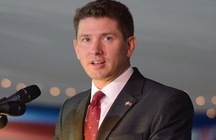I was not an early adopter of twitter. I wondered what I would have to say of interest, and was suspicious of the time it would take. Apprehensively, I sent my first tweet the night I presented my credentials as High Commisioner in Nairobi. Three and a half years later, I am a convert. If the core of our jobs as diplomats is to engage and influence, this is the most powerful tool yet invented to do so.
Three examples of many I could chose that demonstrate that:
- On a Saturday morning in February 2014, news broke in Nairobi that the UK government had ordered BA to cancel all flights to Kenya. Having established that the story was a false upload of a ten year old Daily Mail online article, we tweeted a clarification, along with a link to our travel advice. Within 90 minutes that tweet had reached over a million people and I was able to get on with my weekend with Family Turner. Pre-twitter, I and BHC Nairobi’s excellent comms team would have had to spend hours on media briefing, and would only have reached a fraction of that audience.
- In November 2014 one of Kenya’s best young journalists, Jackson Biko, wrote a brilliantly critical blog about being refused a UK visa. #Visadenied struck a chord with Kenyans and within an hour had been retweeted thousands of times. We took a quick decision to respond to Biko’s concerns, explaining the practicalities of our visa system (see the response) and to engage and explain our policy.
- On September 21 2013, it was twitter that first broke the news of an incident at the Westgate Mall, about 2 hours ahead of mainstream media. Those inside the Mall and early responders used twitter to communicate the terrible terrorist attack that was unfolding, and a four day siege that claimed 67 lives. The early alert allowed the superb Nairobi crisis team to step up our response quickly, and then use the channel to keep British Nationals informed.
Twitter is particularly resonant in Kenya because digital has high penetration amongst a young population. Mobile penetration is high, as evidenced by the high use of DFID initiated MPESA mobile money The President, Foreign Minister and most opinion formers use it. It taps into Kenyan humour and national pride – a recent CNN report criticising Kenya as a “hotbed of terror” led to a global trend #someonetellCNN. Of course, it isn’t an effective medium in all countries, and I am conscious that it is only reaching one part of Kenyan society.
My advice to colleagues not on twitter is to dive in. Contrary to expectations I find it saves time. I have adopted a few rules of thumb: I try to tweet at least once a day to maintain interest. Tweets come from me personally. To try and build my 62k followers (who’s counting…), I have looked for multipliers – the trend setters and key users in country, as well as popular hashtags. I even change the time of day I send tweets to get maximum engagement (analysis shows Kenyans tweet most between 6-7am and 8-9pm on Tuesdays and Saturdays, though I’m not sure why). We have hosted a series of #EatTweet dinners, convening an array of digital activists, politicians, journalists and business leaders active on social media.
Of course, it has its limits. As with most historic advances in technology, social media is neither intrinsically good nor bad – it is how it is used that makes a difference. Six risks that I have tried – and sometimes failed – to navigate:
- Information overload is a constant threat. Twitter is good for the here and now, but filtering is not easy.
- Complexity. One of my favourite adages is that “I would have written you a shorter letter but didn’t have time”. The directness and clarity of 140 characters is a great discipline. But it doesn’t allow for nuanced debate, and risks polarising or simplifying complex issues.
- It is not a popularity contest. We are not comedians, journalists or politicians, and we should not pretend to be. A high number of followers is not an end in itself (though please don’t tell @TFletcher or @JonBenjamin19 that).
The risk of getting it wrong. We have less time to think than we used to. Ours is a profession where inappropriate or unclear phrasing can undermine hours of negotiations. . Ultimately, my message on twitter should be little different from what I would say in a TV interview or newspaper op-ed.
The potential for misinformation. Easily manipulated, falsehoods can be taken as fact. And while social media tends to support our values of freedom and openness, it can also be a voice for those who oppose our values (Al Shabab are on twitter).
So although I am convinced that social media enhances the diplomat’s toolkit, I don’t think it fundamentally changes our core business: information gathering, analysis and influence. We still need to be authentic; we still need to focus on the national interests we are promoting; and sometimes we also need a thick skin. Twitter allows us to connect, directly rather than through a filter, with the views of tens of thousands of people. We can engage on a larger scale with the countries we live in more than ever before. The medium is powerfully subversive exactly because we no longer have to focus solely on elites to make and represent our case.
To engage or not to engage, that is the question.

